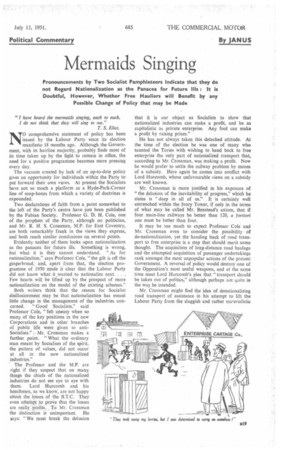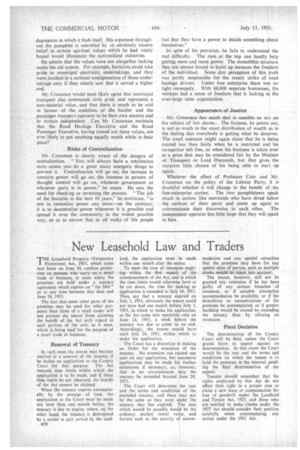Mermaids Singing
Page 53

Page 54

If you've noticed an error in this article please click here to report it so we can fix it.
Pronouncements by Two Socialist Pamphleteers Indicate that they do not Regard Nationalization as the Panacea for Future Ills : It is Doubtful, However, Whether Free Hauliers will Benefit by any Possible Change of Policy that may be Made
"I have heard the mermaids singing, each to each. I do not think that they will sing to me."
7', S. Eliot.
N0 comprehensive statement of policy has been issued by the Labour Party since its election manifesto 18 months ago. Although the Government, with its hairline majority, probably finds most of its time taken up by the fight to remain in office, the need for a positive programme becomes more pressing every day.
The vacuum created by lack of an up-to-date policy gives an opportunity for individuals within the Party to put forward their own views. At present the Socialists have not so much a platform as a Hyde-Park-Corner line of soap-boxes from which a variety of doctrines is expounded.
Two declarations of faith from a point somewhat to the left of the Party's centre have just been published by the Fabian Society. Professor G. D. H. Cole, one of the prophets of the Party, although no politician, and Mr. R. H. S. Crossman, M.P. for East Coventry, are both remarkably frank in the views they express, and both reach similar conclusions on several points.
Evidently neither of them looks upon nationalization as the panacea for future ills. Something is wrong, but what it is they cannot understand. " As for nationalization," says Professor Cole, "The gilt is off the gingerbread; and, apart from that, the election programme of 1950 made it clear that the Labour Party did not know what it ,wanted to nationalize next. . . . Few hearts will be lifted up by the prospect of more nationalization on the model of the existing schemes."
Both writers think that the reason for Socialist disillusionment may •be that nationalization has meant little change in the management of the industries concerned. "Good Socialists," said Professor Cole, "felt uneasy when so many of the key positions in the new Corporations and in other branches of public life were given to antiSocialists." Mr. Crossman makes a further, point. "What the ordinary man meant by Socialism of the spirit, the pattern of values, did not occur at all in the new nationalized industries."
The Professor and the M.P. are right if they suspect that on many. things the chiefs of the nationalized industries do • not see eye to eye with them. Lord Hurcomb and his henchmen, as we know, are not happy about the losses of the B.T.C. They even atte.mpt to prove. that the losses are really profits.. To Mr. Crossman the distinction is unimportant. He says: "We must break the delusion that it is our object as Socialists to show that nationalized industries can make a profit, and be as capitalistic as private enterprise. Any fool can make a profit by raising prices."
He has not always taken this detached attitude. At the time of the election he was one of many who taunted the Tories with wishing to hand back to free enterprise the only part of nationalized transport that, according to Mr. Crossman, was making a profit. Now he would prefer to settle the railway problem by means of a subsidy. Here again he comes into conflict with Lord Hureomb, whose unfavourable views on a subsidy are well known.
Mr. Crossman is more justified in his exposure of " the delusion of the inevitability of progress," which he states is "deep in all of us." It is certainly well entrenched within the Ivory Tower, if only in the terms of what may be called Mr. Benstead's axiom, that if four main-line railways be better than 120, a fortiori one must be better than four.
It may be too much to expect Professor Cole and Mr. Crossman even to consider the possibility of de-nationalization, yet the handing back of road transport to free enterprise is a step that should merit some thought. The acquisition of long-distance road haulage and the attempted acquisition of passenger undertakings rank amongst the most unpopular actions of the present Government. A reversal of policy would destroy one of the Opposition's most useful weapons, and at the same time meet Lord Hurcomb's plea that "transport should be taken out of politics," although perhaps not quite in the way he intended.
Mr. Crossman might find the idea of denationalizing road transport of assistance in his attempt to lift the Labour Party from the sluggish and rather materialistic depression in which it finds itself. His argument throughout the pamphlet is ennobled by in obviously sincere belief in certain spiritual values which he had vainly hoped would illuminate the nationalized industries, He admits that the values were not altogether lacking under the old system. For example, Socialists could take pride in municipal electricity undertakings, and they were justified in a national amalgamation of those undertakings only if they clearly saw that it served a higher end.
Mr. Crossman would most likely agree that municipal transport also commands civic pride and represents a non-material value, and that there is much to be said in favour of the ambition of the haulier and the passenger transport operator to be their own masters and to remain independent. Can Mr. Crossman maintain that the Road Haulage Executive and the Road Passenger Executive, having ironed out these values, are ever likely to put anything equally worth while in their place?
Risks of Centralization
Mr. Crossman is clearly aware of the dangers of centralization. "You will always have a totalitarian state unless you do a great many energetic things to prevent it. Centralization will go on; the increase in coercive power will go on, the increase in powers of thought control will go on, whatever government or whatever party is in power," he states. He sees the need for checking or reversing the process. "The job of the Socialist in the next 10 years," he continues, "is not to centralize power any more—on the contrary, it is to decentralize power whenever it is possible and spread it over the community in the widest possible way, so as to ensure that in all walks of life people feel that they have a power to decide something about themselves."
In spite of his prevision, he fails to understand the real difficulty. The men at the top can hardly help getting more and more power. The monolithic structure they are almost forced to build up menaces the freedom of the individual. Some dim perception of this truth was partly responsible for the recent strike of road haulage drivers. Under free enterprise there was no tight monopoly. With 60,000 separate businesses, the workers had a sense of freedom that is lacking in the over-large state organization.
Appearance of Justice Mr. Crossman -has much that is sensible to say on the subject of fair shares. The fairness, he points out, is not so much in the exact distribution of wealth as in the feeling that everybody is getting what he deserves. The small operator might again claim that he is being treated less than fairly when he is restricted and his competitor left free, or when his business is taken over at a price that may be considered fair by the Minister of Transport or Lord Hurcomb, but that gives the recipient little chance of his being able to start up again.
Whatever the effect of Professor Cole and Mr. Crossman on the policy of the Labour Party, it is doubtful whether it will change to the benefit of the free-enterprise carrier. The two pamphleteers speak much in unison, like mermaids who have dived below the surface of their party and come up again to communicate their discoveries to each other. The independent operator has little hope that they will speak to him.




























































































